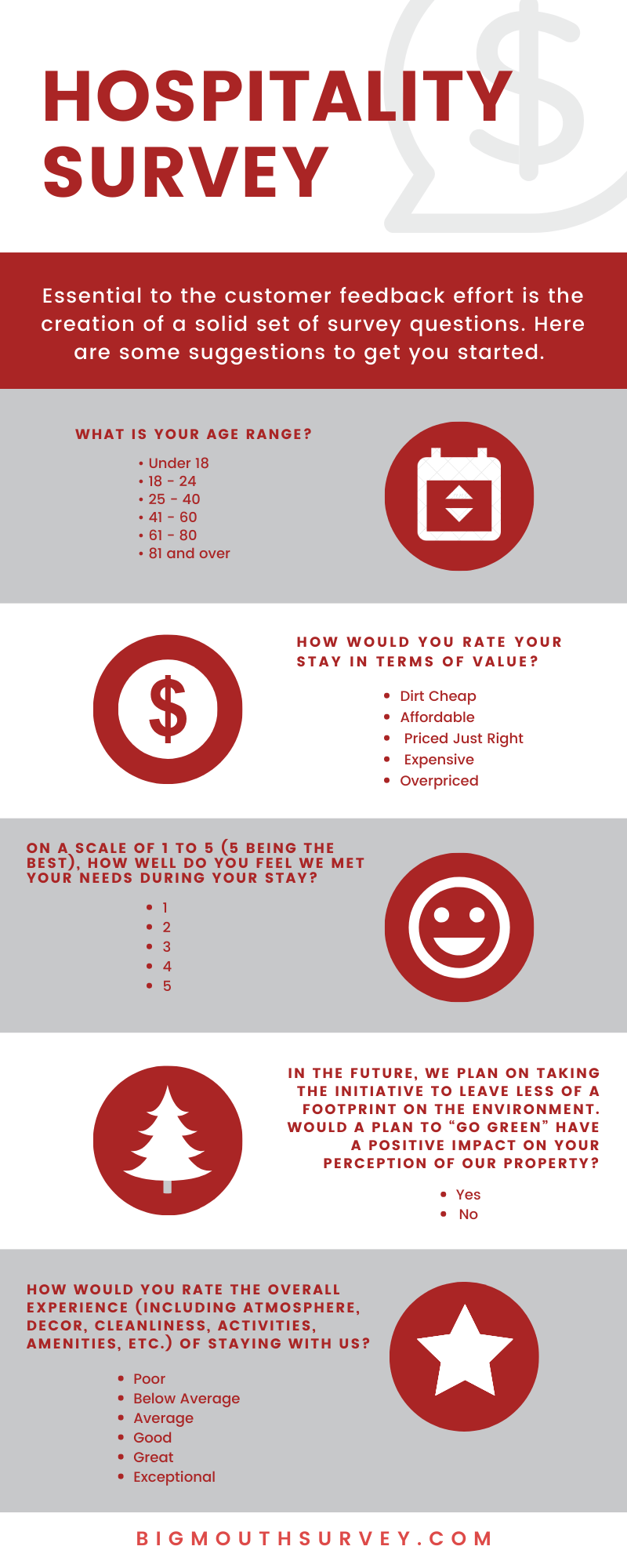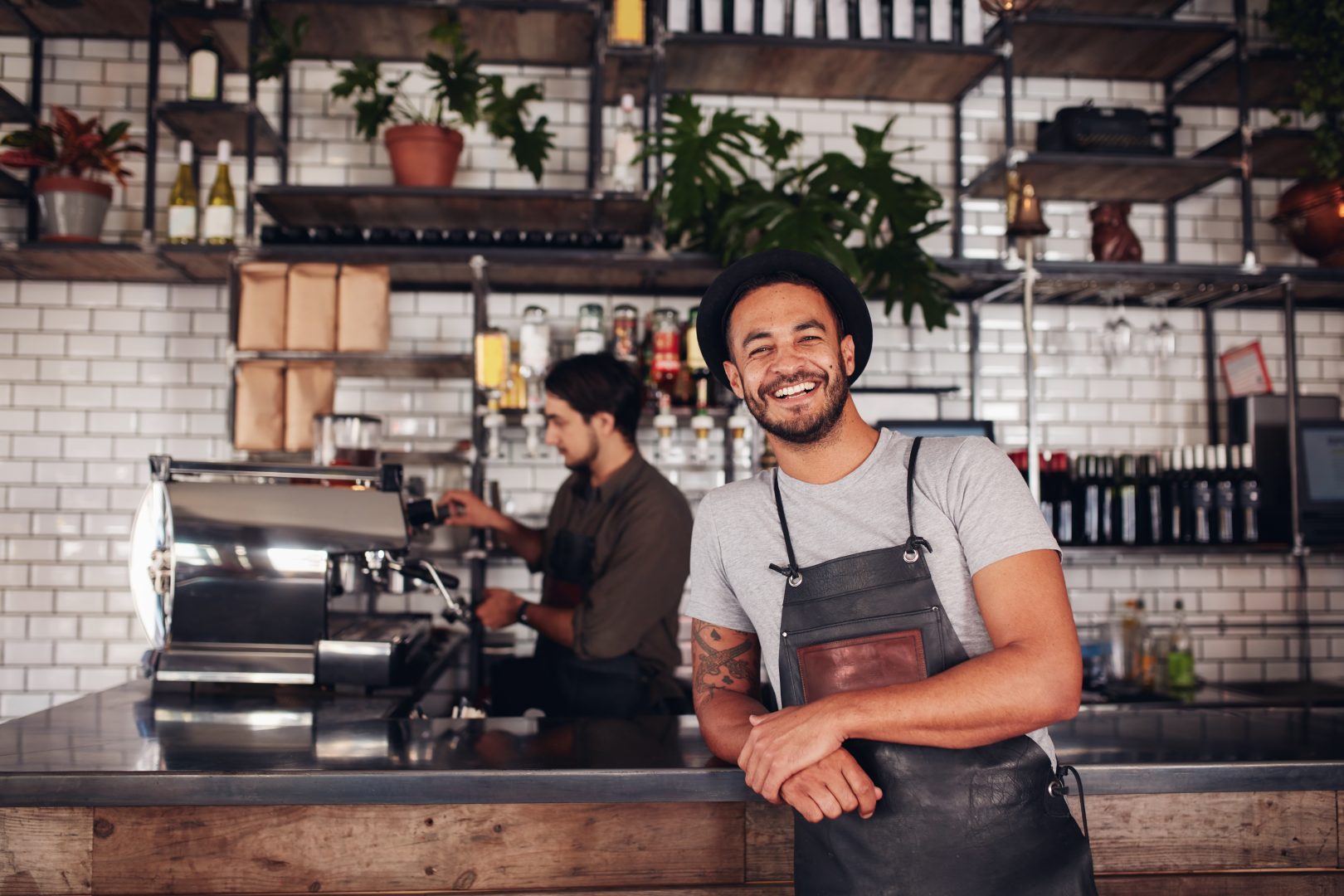Last updated 02-10-2020
By:
Jessica Wise
My sister and her husband recently traveled to Ubud, Bali for the first time.
There were numerous hotels and resorts to choose from…each one more stunning than the last.
But, when it came down to booking, the two decided that in order to make the most of their trip they would reserve a room through Airbnb.
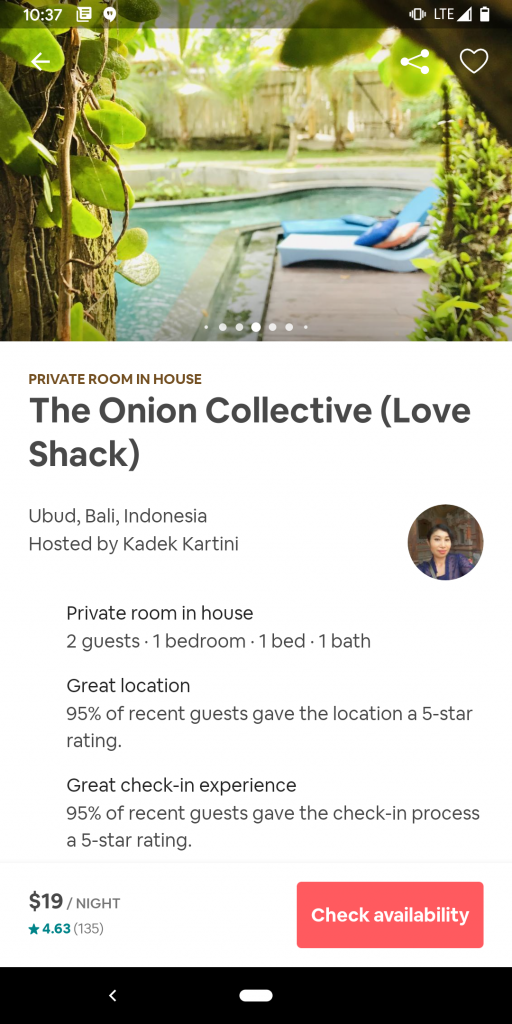
Their choice had nothing to do with hotel room prices or convenience. It had to do with fully immersing themselves in the culture of an island that had been on their travel bucket list for years.
I’m happy to report that they were far from disappointed with their decision.
When they arrived at their hut (yes they stayed in an actual hut!), they were greeted warmly by their host, Kadek, and resident dog, Kemala.
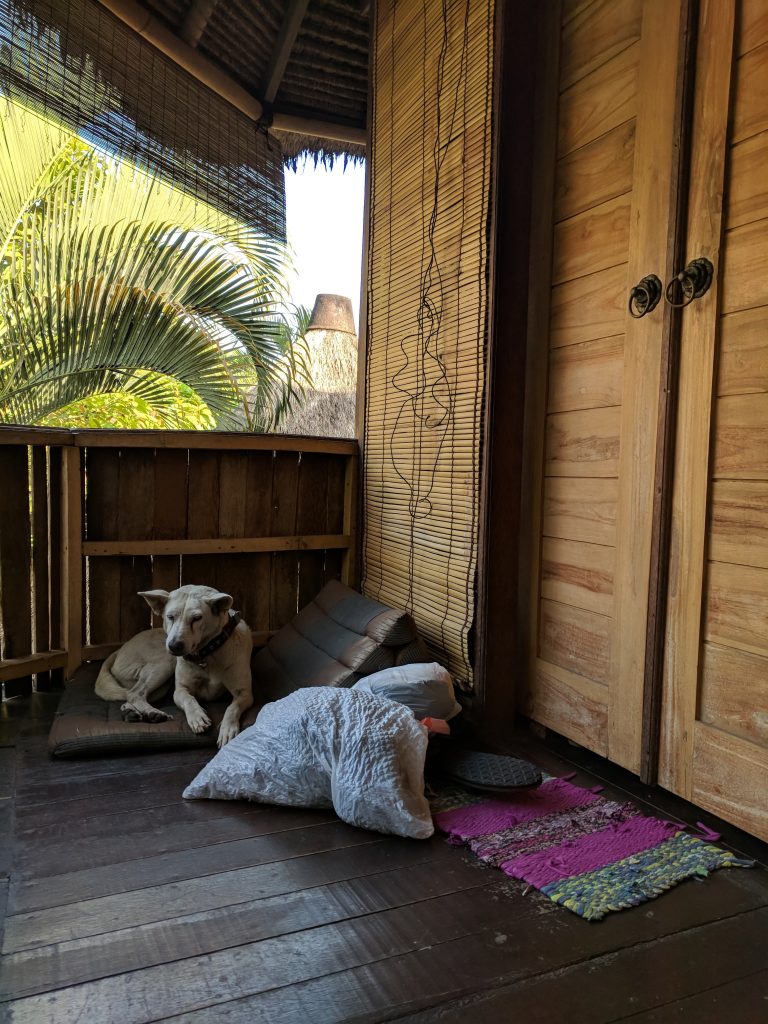 Kemala The Balinese Dog
Kemala The Balinese Dog
And, to their delight, Kadeck had prepared traditional Balinese finger foods and cocktails to welcome them.
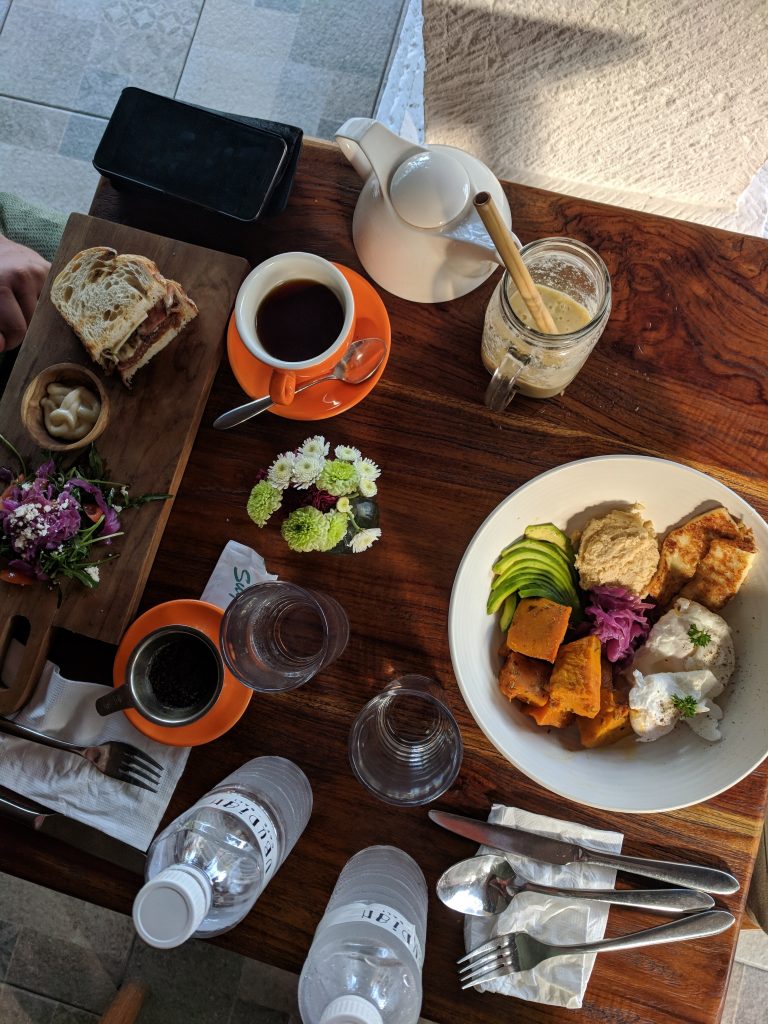 Traditional Balinese Food
Traditional Balinese Food
During their stay, she even provided motorbikes so my sister and her husband could explore the city at their leisure. She also arranged an excursion for them to hike a nearby volcano.
I could go on…but the point here is that their stay at the “Onion Collective” Airbnb turned out to be more than they ever could have expected from a hotel.
Experiences like this are the reason Airbnb is one of the biggest threats to the hotel industry today.
The bad news is that it’s not the only threat facing the hotel industry in 2020.
It’s only one of 5 dangerous trends facing hotels this year.
Are you scared yet? Well, have no fear.
First, we’re going to talk a bit more about the obstacles hoteliers are up against. Then, we’re going to reveal how your hotel can beat the odds and become an indispensable part of every traveler’s itinerary.
1. Airbnb
After an intro like that, I’m sure it’s no surprise that Airbnb comes in at #1 on our list.
Not only does the brand provide for personal, immersive experiences, but Airbnb is also beating out hotels with more affordable options and minimal regulations.
In fact, according to research conducted by Second Measure, Airbnb now owns about 20% of the entire US consumer lodging market.
Here are a few more reasons why this brand is dangerous.
More Bang For The Buck
Travelers can rent an entire home or apartment on Airbnb for the price of a hotel room.
For example, I’m taking a trip to Philadelphia this weekend. We will be staying at the Residence Inn in Center City, which has an average starting rate of $189 per night.

However, after conducting a search on Airbnb’s website, I found that I can rent an entire apartment in Rittenhouse Square for $60 per night. It’s tempting not to change the reservation.

Flexibility
Airbnb hosts tend to be more accommodating than your average hotel chain. In most cases, the host owns or rents the property. Hence, they make their own rules.
They don’t have to cut through the same red tape that a hotel manager would. This leaves guidelines such as check-in and check-out times up for negotiation.
The Defense
Be loud about the amenities and features your hotel does have.
Sure, Airbnbs face fewer regulations than hotels, which may allow hosts to offer extra perks.
However, most Airbnb’s lack amenities like on-site security or free breakfast. In addition, Airbnb hosts can cancel reservations at their discretion, while a hotel’s bookings are guaranteed reservations.
So, identify your strengths and ensure that potential guests know what they are. Also, consider offering incentives to repeat guests. For example, give returning guests access to later check-out times.
2. Personalization
Now, let me hit you with some cold, hard facts.
Personalization is both wanted and expected by your potential guests, and if you don’t give it to them, someone else will.
A whopping 86% of consumers say personalization plays a role in their purchase decisions, and 62% say they have recommended, chosen, or paid more for a brand that provides personalized service (Revinate).
This is one of the very reasons the #1 dangerous trend on our list has been so successful in its quest to steal guests from the hotel industry.
Unfortunately, Airbnb isn’t the only competitor you have to worry about.
Major hotel chains like Marriott International and Hilton have already jumped on the personalization bandwagon by investing in “smart guest rooms” (i.e. rooms equipped with smartphone enabled climate and light control and connected smart TVs and smart speakers).
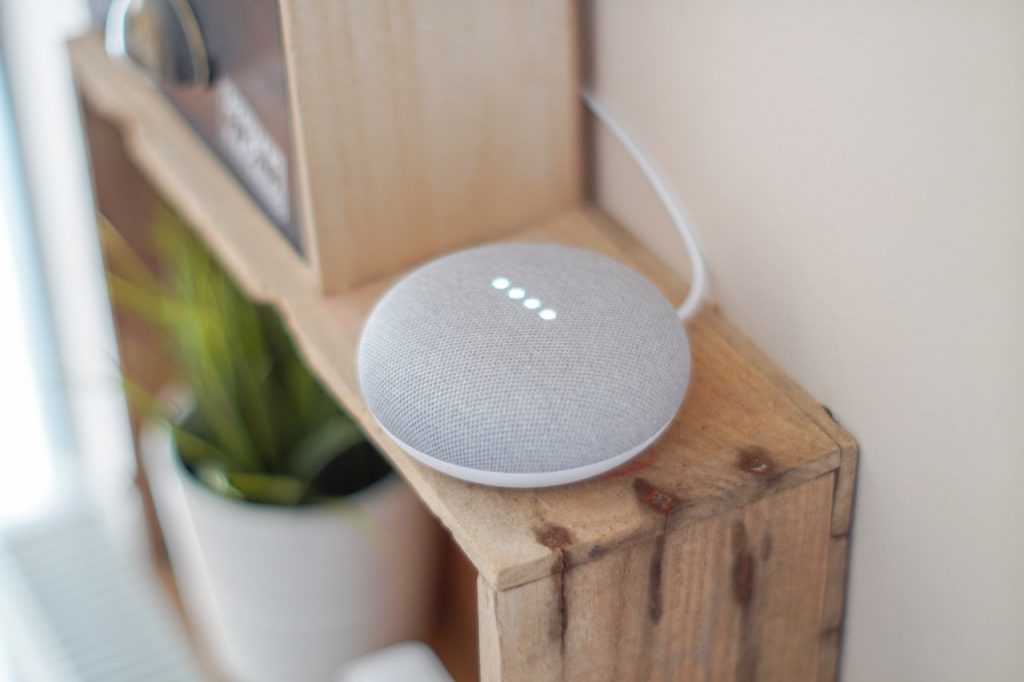 Smart speakers are becoming standard hotel room features.
Smart speakers are becoming standard hotel room features.
Hoteliers that fail to join this movement will face a bleak future.
Case and point: 63% of consumers stop purchasing products and services from companies who provide poorly executed personalization (SmarterHQ).
The Defense
Due to technological advancements, the hospitality landscape is ever changing.
Eventually, the hotel market will become saturated with smart rooms, robot butlers, and keyless room entry, and the next big trend in personalization will emerge.
Thus, your strategy should be to stay ahead of the game. You can do that by getting to know your guests on a deeper level.
However, obtaining a single view of each quest can be a tall order if you don’t have the right tools.
According to marketing charts, the biggest challenges to obtaining a more intimate view of your guests are gaining insight quickly enough (40%), having enough data (39%), and inaccurate data (38%).
 An In-depth View of your Guests May be Difficult to Come by if You Don’t Have the Right Tools.
An In-depth View of your Guests May be Difficult to Come by if You Don’t Have the Right Tools.
The good news is that each of these roadblocks can be easily eliminated by placing customer feedback survey kiosks at important touchpoints on your property.
New to the scene and powered by intelligently designed software, customer feedback survey kiosks collect and reveal guests’ reviews and expectations to hotel staff in real-time.
Not only will you learn what your visitors do and don’t want, but you will also be able to proactively engage with them before they leave the premises for good.
3. Sustainability
In recent years, environmental concerns have become a hot button issue in the U.S. and abroad.
Globally, 91% of consumers now expect companies to operate in a socially and environmentally responsible way, rather than just focusing on profitability (Cone Communications and Ebiquity).
As a result, many tourists are turning to environmentally conscious lodging alternatives like glamping, cabins, hostels & more.
There’s even a green travel brand called Ecobnb that mimics Airbnb’s already established concept!

The Defense
One way your brand can build a stronger relationship with your guests is by showing them that what matters to them also matters to you.
89% of U.S. consumers say they are loyal to brands that share their values (Wunderman).
Possible plans to “go green” could include:
- Going paperless & keyless by managing all documentations via smartphone applications
- Installing solar panels to reduce energy consumption and emissions
- Repurposing waste to be used as compost for property landscaping
- Reducing water consumption by installing low flow faucets and aerated shower heads
- Reducing energy consumption by making the switch from incandescent light bulbs to high-efficiency LED light bulbs
I won’t lie. You will have to get out your checkbook to make these types of changes to any sizable property.
However, making environment-friendly updates to your property will benefit the business’s bottom line in the long run.
A recent study revealed that companies have the potential to unlock $12 trillion by 2030 in business savings and revenue by pursuing sustainable, low-carbon business models (Financial Times).
4. The Experience Economy
I have a favorite hotel.
It’s not my favorite because of price (it’s kind of expensive) and it’s not my favorite because of location (it’s at the beach but not on the beach).
It’s my favorite because of the experience I have when I go there.
For starters, The Asbury Hotel is dog-friendly. That’s a must for me.
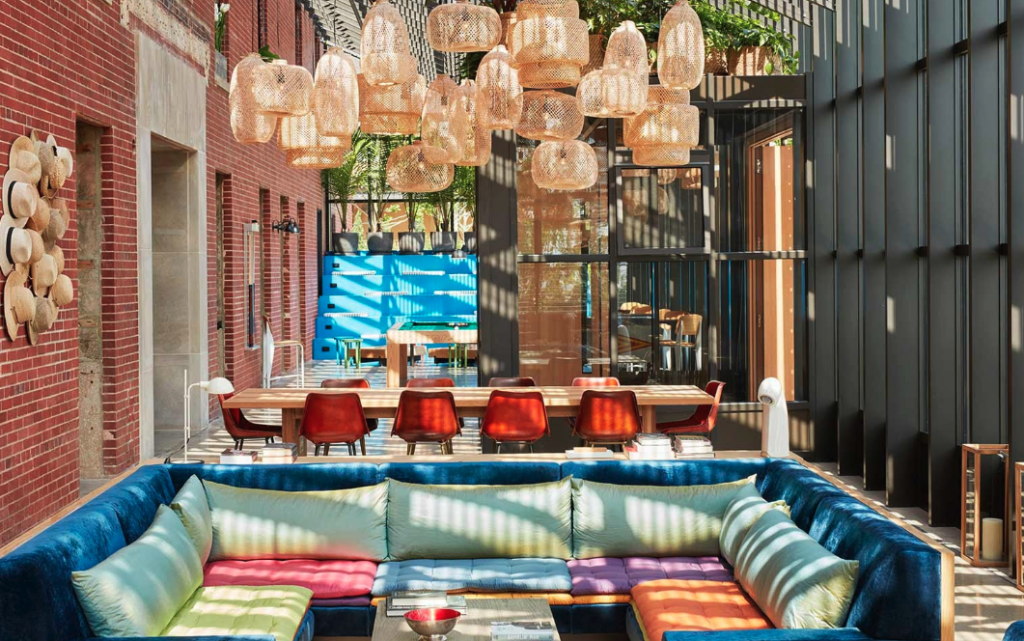 The Asbury Hotel in Asbury Park, NJ
The Asbury Hotel in Asbury Park, NJ
The walls are brilliantly decorated in vintage and rock-n-roll decor and the demeanor of the staff coincides with the fun, bright atmosphere. In the evenings, they often have live music in the lobby, and guests lounge around with their dogs, while sipping on cocktails from the hotel bar.
Just like me, 74% of Americans now prioritize experiences over price and product (Luxury Travel Advisor).
Travelers are looking to make memories. We want local guides, hotel activities, excursions, restaurant recommendations, and we want yoga on the rooftop at sunrise (Yes, The Asbury has that, too.)
If you don’t offer your guests an immersive, inclusive experience at your location, chances are they’ll stay somewhere else the next time they’re in town.
According to a recent study by Forrester Research, consumers say how a brand makes them feel is 1.5x more important in their buying decision than any other factor.
And, at the current rate, real-life, location-based experiences are projected to become a $12 billion dollar industry by 2023 (Quartz).
The Defense
An amazing 91% of consumers say they have more positive feelings about brands after attending events and experiences (iCreativeGroup).
So, make staying at your hotel an event in itself.
Of course, you’ll have to invest a little time in getting to know your customer-base first. Then, you can develop an event and activity schedule based on your findings.
This brings us back to the importance of collecting guest feedback.
Maybe a brief customer feedback survey will reveal that a large portion of your guests typically travel with children. In that case, it would be beneficial to develop a kids club program. This type of move like could win you a ton of brownie points.
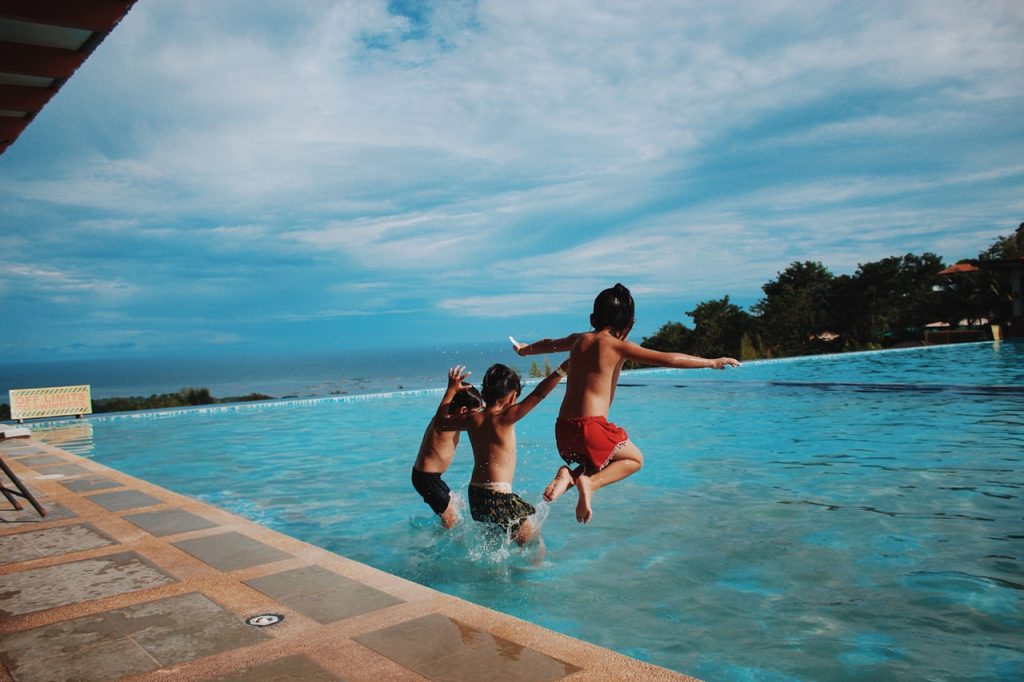 Kids Clubs Can Score Big Points with Parent Travelers.
Kids Clubs Can Score Big Points with Parent Travelers.
Or, you might take a poll to reveal your guests’ recreational interests. Then, offer one free lesson or class of their choice during their stay.
5. Millennials Travel Differently
Millennials are the most powerful consumer demographic in today’s economy. They’re also the hardest to acquire and keep as guests.
For two reasons, of all the dangers on this list, they are by far the most difficult trend to combat.
Reason #1: Millennials don’t have the spending capacity of other generations. Most of us are living paycheck to paycheck. 47% of millennials say cost is a barrier for why they won’t travel (AARP).
Reason #2: When they do travel they want to spend their money on a hotel that has already eliminated the other four dangers on this list.
Millennials expect:
- Affordable Stay (Airbnb) – Millennials are the most budget conscious of traveling generations. “Millennials operate on a principle of value: they try to spend as little as possible, so that they can do a lot and experience more; they want to get the most bang for their buck. Further, they try to keep cost down for where they stay, which translates into them staying at places like Airbnbs — and they’ll even share rooms, too,” writes, Brittany Kriegstein of Business Insider.
- Personalized Service – They want to feel recognized and appreciated as opposed to feeling like just another face in the crowd. 72% of millennial shoppers think brands should provide a personalized experience (CMO).
- Planet Consciousness – 61% of millennials are worried about the state of the world and feel personally responsible to make a difference (Huffington Post). So, they’d much rather spend their time and money on a property that supports the same values
- Not Just a Stay, An Experience – Gen Y’s main concern is how their stay with you makes them feel. 72% of millennials prefer to spend their money to engage in live events instead of on material possessions—or even virtual ones (Eventbrite). They are also the most adventurous with 75% indicating a desire to “live like a local” when they travel (AARP).
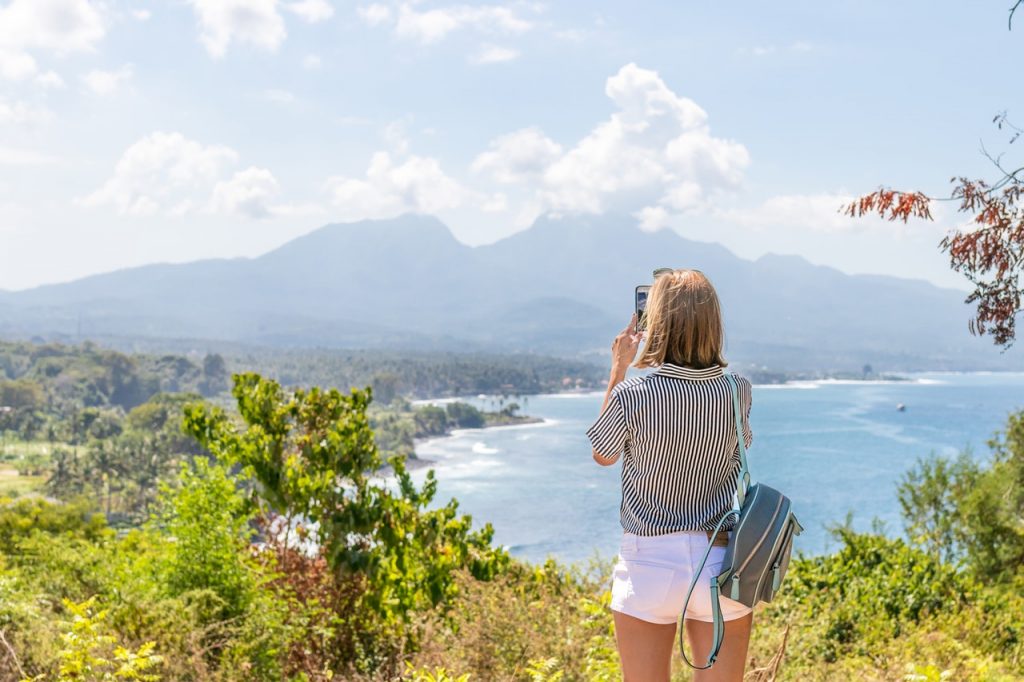 Millennial Travelers Expect the Most From You
Millennial Travelers Expect the Most From You
The Defense
Ask yourself: “What do my guests really want?”
Here’s the bottom line.
We’ve discussed what you need to do and why you need to do it.
Every property is different. Every hotel chain is different. Not only that, every single guest that walks through your doors is different than the last.
This isn’t the type of business where you can take a stab in the dark and hope you hit the mark.
Success will be determined by your ability to know and understand your guests. It will also be defined by how well you utilize the customer feedback you collect to make adjustments to your business model.
What You Should Ask Them
Here are some potential survey questions to get you started:
